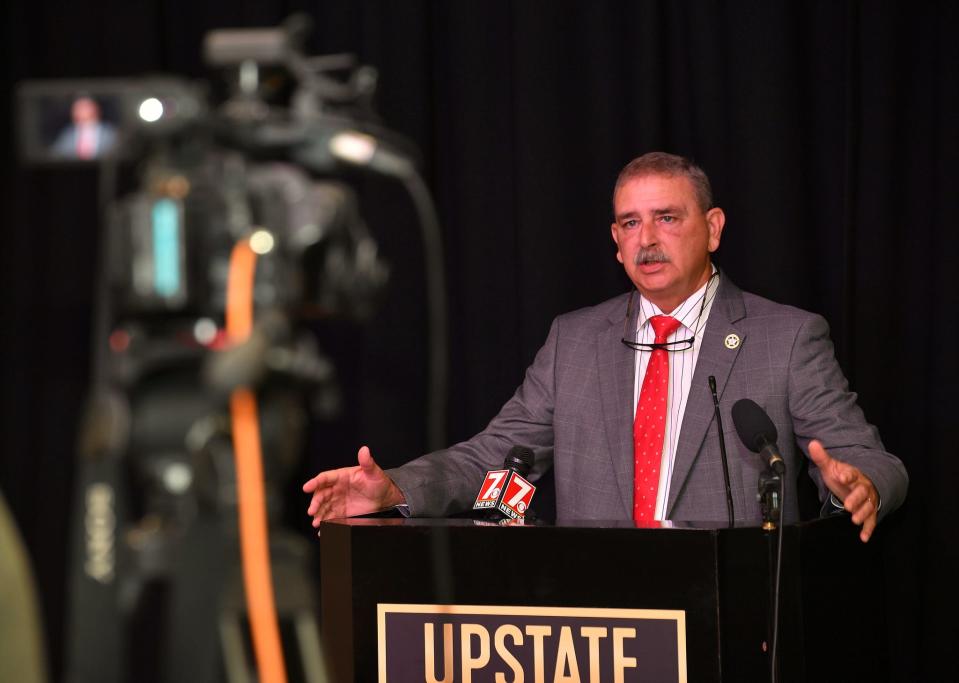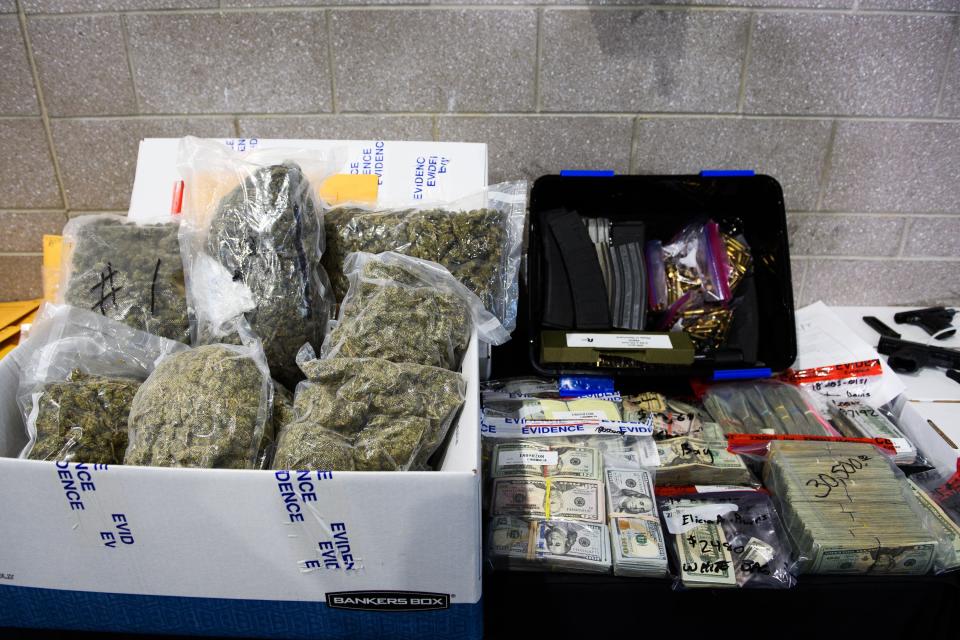Lawsuit filed for access to Spartanburg Sheriff's Operation Rolling Thunder records
A lawsuit filed late Tuesday afternoon against Spartanburg County and the Spartanburg County Sheriff’s Office aims to provide the public access to records related to the sheriff's office annual Operation Rolling Thunder.
The lawsuit, filed Jan. 16, by the nonprofit, public interest law firm Institute for Justice headquartered in Arlington, Virginia was on behalf of a South Carolina resident. The lawsuit says that Spartanburg County improperly denied the woman's Freedom of Information Act (FOIA) request related to the search and seizure operation conducted by the sheriff's office.
The complaint, filed in South Carolina state civil court, asks for injunctive relief within ten days, an order saying the county violated FOIA law and the court to compel the county to produce the records request.
Operation Rolling Thunder is a weeklong search and seizure operation conducted by the Spartanburg Sheriff's Office and other assisting agencies to remove drugs and other forms of illegal contraband off South Carolina's highways.
The lawsuit asks for details about all searches made during Operation Rolling Thunder in 2022 from Oct. 1-7. The sheriff’s office and assisting agencies searched 144 vehicles and seized nearly $1 million according to data released by the office. In Oct. 2022, the Herald-Journal reported that one traffic stop, which yielded no seizures, led to a federal civil rights complaint.
In the most recent operation, conducted in late 2023, the sheriff's office seized over half a million dollars and searched 172 vehicles. Nine felony and four fugitive arrests were made during the entire operation.
The lawsuit references findings from the Greenville News' TAKEN series, an investigation in 2019 that took a statewide look at civil asset forfeiture by South Carolina law enforcement. The News found that agencies in the state seized more than $17 million from 2014 to 2016.
The Spartanburg County Sheriff's Office seized nearly $3.5 million of that, more than any other agency in the state.
"During Operation Rolling Thunder, law enforcement agencies take to the highways in Spartanburg County, South Carolina, and stop as many vehicles as possible—often on the thinnest of pretexts—to seize and forfeit property," a press release from the Institute for Justice said. "The lawsuit seeks information under the authority of South Carolina’s Freedom of Information Act, which requires government agencies to function openly."

Lawsuit demands public access to Spartanburg search and seizure information after citizen denied records
The lawsuit is filed on behalf of South Carolina resident Adrianne Turner, who submitted a public records request on May 12, 2023, following two similar requests from the Institute for Justice, a public interest law firm conducting research for its Project on the Fourth Amendment.
The lawsuit aims to compel the public records requested by Turner, which Spartanburg County denied on the basis of being too burdensome. The county did not cite any exemptions under the law in their denial.
The Institute for Justice filed their initial request on Oct. 11, 2022 and was also denied a reconsideration request filed on Nov. 10, 2022. Neither request by the Institute for Justice is part of the lawsuit, but is mentioned in the county's denial of Turner's FOIA request.
A screenshot of a closed Spartanburg County records request by Turner is included in the lawsuit. In rejecting her request, the county cited three reasons for denial. The county claimed her request was "unduly burdensome," sought records that do not exist and was repetitive because it matched previous requests from the Institute for Justice.
Turner's request asked for copies of all the incident reports for each vehicle searched in Operation Rolling Thunder 2022, which lasted from Oct. 1-7. In those reports, she asked for the date, time and location of the traffic stops, as well as the race and ethnicity of each motorist stopped. She also asked for a full narrative report that included the reason for the stop, probable cause for search of the vehicle and what resulted from the stop, including arrests and seizures.
The Fourth Amendment states that probable cause must exist for law enforcement to conduct a search, absent a civilian giving consent.
Spartanburg County's rejection of Turner's FOIA request, signed by county attorney Ryan Gaylord, states that her request would be very costly and would have taken months to complete. The county said that fulfilling her request would mean county officials would need to review and redact necessary documents of non-public information.
The lawsuit states that the county did not cite any legitimate grounds the records are exempt under South Carolina FOIA law, and instead argued the request was burdensome.
In their press release, the Institute of Justice claims the county is only releasing information favorable to the sheriff's office, and said the lack of transparency allows the county to control the narrative surrounding Operation Rolling Thunder while hiding possible abuses of power.

“The sheriff spoon-feeds information to the public,” Institute for Justice senior attorney Rob Johnson said in the release. “People have a right to know what is going on behind the press conference podium. If the government can pick and choose what facts to release, then anything abusive or unflattering will stay hidden.”
National law firm Latham & Watkins is representing Turner with support from the Institute for Justice. Greenville, South Carolina lawyer Jake Erwin is also representing Turner as local counsel.
The county has thirty days to respond to Turner's complaint.
The county and sheriff's office did not immediately respond to a Tuesday night request for comment by the Herald-Journal.
More: TAKEN: How police departments make millions by seizing property
What is civil asset forfeiture? Hundreds of thousands of dollars taken every year during Rolling Thunder
The release from the Institute of Justice lists the "aggressive pursuit" of money through civil forfeiture as a "major concern." This law enforcement tactic allows the government to seize and keep property sometimes without a criminal conviction or even an arrest, the lawsuit says.
The complaint references prior reporting from the Greenville News' TAKEN series, which examined the statewide practice of search and seizures by law enforcement from 2014 to 2016. The investigation found agencies in the South Carolina seized more than $17 million through civil forfeiture over three years. It also found that nearly one-fifth of the more than 4,000 people who had their assets seized weren't charged with a related crime.
Roughly the same number — nearly 800 people — were charged with a crime but not convicted.
In South Carolina, 95% of forfeiture revenue goes back to law enforcement and the rest is deposited into the state’s general fund. The lawsuit calls this practice a "perverse incentive" to search as many vehicles as possible.
“The result can be policing for profit, which occurs when agencies shift their focus from public safety to revenue,” Johnson said.
The bulk of that money finances law enforcement, specifically to fight drug related crimes, but there’s little oversight of what was seized or how it’s spent, the investigation found. Police use it to pay for new guns and gear, training, meals and food for their police dogs.

The TAKEN investigation found that the money is seized in small bites that add up, and that it takes a while to get it back if contested by a citizen. The burden is on the citizen to recover the property, and an attorney isn't provided because the issue is a civil matter rather than a criminal one.
Of the individual instances of cash seizures examined in the investigation, more than half the seizures took less than $1,000 per stop and one-third of the seizures involved less than $500 per stop.
Prosecutors often take longer to file for forfeiture than the two-year period state law allows for a civil case. The average time between when property is seized and when a prosecutor files for forfeiture is 304 days and items taken are held the whole time.
More: Exclusive: How civil forfeiture errors, delays enrich SC police, hurt people
The U.S. Commission on Civil Rights published a report on civil asset forfeiture in South Carolina in November 2022. The report, mentioned in the lawsuit, says that the state “has few...meaningful limitations to protect the due process rights of the state’s residents” and “lacks many procedural safeguards that are commonplace in other states.”
In South Carolina, law enforcement only needs probable cause to seize a citizen's property. Once seized, the matter becomes civil, and the burden of proof to prove innocence is on the owner, the report states.
While the investigation documented civil asset forfeiture throughout the state, it showed the Spartanburg County Sheriff’s Office seized nearly $3.5 million from 2014-2016, more money than any other agency in the state.
The sheriff's office often releases data after Operation Rolling Thunder is completed.
During last year's operation alone, which spanned the last week of November, county law enforcement seized over half a million dollars. There were 172 vehicles searched, 65 K-9 searches were conducted and over 4,000 "other property" items were seized.
In 2022, the department seized just shy of $1 million.
In 2023, the operation yielded 30 arrests. Of those, only nine were felony arrests, while four were fugitive arrests. It also yielded 12 weapons violations, half on the last day of the four-day operation.
Other kinds of property can be seized aside from cash. As part of the TAKEN series, the Herald-Journal reported that Spartanburg County Sheriff Chuck Wright, a notable proponent of the practice of asset forfeiture, drove a $50,000 Ford Raptor he seized from a citizen in a high-dollar gambling case.
The sheriff's office seized 21 vehicles, 19 guns and other property between 2014 and 2016.
More: Inside look: How SC cops swarm I-85 and I-26, looking for 'bad guys'
Race a factor in traffic stops and civil forfeiture, TAKEN and recent Rolling Thunder data shows
The TAKEN investigation and more recent Operation Rolling Thunder data released by the sheriff's office shows that Black people are more likely to be subject to a traffic stop or forfeiture, as well as further difficulties.
While Black people constitute 26% of South Carolinians, the data analysis of forfeitures from 2014-2016 in the TAKEN investigation showed that almost two-thirds of people targeted by forfeiture were black males. Further, the investigation found that white people were around twice as likely to get their money back than Black people.
In 2023, 877 individuals were stopped as part of Operation Rolling Thunder. 373 (42.53%) of those were Black, 347 (39.57%) were white, 110 (12.54%) were Hispanic and 47 (5.36%) were defined as "other."
Spartanburg County's population is 21% Black, compared to 74% white and 8% Hispanic/Latino, though many out-of-county drivers travel through on Interstates 85 and 26.
While 26% of South Carolina's population, Black individuals represent 22% and one-third of neighboring North Carolina and Georgia's population, respectively, all below the percentage of of Black individuals stopped in the two most recent operations.
More: 65% of cash seized by SC police comes from black men. Experts blame racism.
After a bus full of students from Shaw University, an HBCU in Raleigh, NC, was stopped during the 2022 operation, Sheriff Chuck Wright denied allegations of racial profiling. The officers who conducted the stop said the bus was unmarked and had tinted windows.
Nothing was found and the bus driver was cited for a lane violation. The university filed a federal complaint over the incident.
Tuesday's complaint on behalf of Turner requests information on the 2022 operation, where 144 vehicles and 803 individuals were searched. 315 (39.2%) individuals searched were white, 308 (38.4%) were Black, 125 (15.6%) were Hispanic and 55 (6.8%) were defined as "other."
The entire table of contents for the TAKEN series can be found here. To read more about how the TAKEN series was reported, click here.
ORT FOIA Lawsuit Embed by Chalmers Rogland
Chalmers Rogland covers public safety for the Spartanburg Herald-Journal and USA Today Network. Reach him via email at crogland@gannett.com.
This article originally appeared on Herald-Journal: Lawsuit seeks access to Spartanburg Operation Rolling Thunder records

